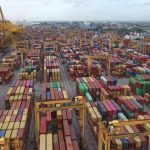Scrubbers are a relatively simple technology designed to remove polluting sulphur oxides from a commercial ship’s engine exhaust and cut air pollution. But despite that modest moniker, scrubbers have generated a controversy that sees the devices — and the companies that use them — accused of threatening marine life, contributing to ocean acidification, and polluting the oceans.
A report by the Clear Seas Centre for Responsible Marine Shipping (Clear Seas) investigates the controversy, examines the issues around scrubbers — formally known as exhaust gas cleaning systems — and provides an overview of the pollutants and the different types of chemical concentrations found in their discharge.
Critics of scrubbers say they are transferring the problem by simply moving pollutants from the air into the world’s oceans and waterways. The Clear Seas study explores the main concerns relating to scrubber discharge water, including the levels of contaminants and pH in scrubber discharges. Read the report here.
“A complete assessment of the impact of scrubbers can’t just focus on the reduction of air emissions, but needs to also consider the impact of the scrubber wastewater discharge into the marine environment,” says Paul Blomerus, Executive Director, Clear Seas.
The study supports the conclusions of policy makers and local regulators — such as the ports of Vancouver, B.C., and Sept-Îles, Q.C. — who are restricting the discharge from scrubbers in confined waters like estuaries, harbours, and the anchorages where ships wait before unloading and loading cargo.
This research contributes new findings to the debate on the impact of scrubbers and supports effective planning, use, and regulation of these devices in Canadian waters and elsewhere. It identifies shortcomings in the available assessments, brings clarity to conflicting views on the acceptability of scrubbers from an environmental standpoint, and provides recommendations related to scrubber discharge water monitoring and analysis as well as the effectiveness of the current international guidelines.
The study reviewed:
The socioeconomic and environmental concerns surrounding the use of scrubber systems on board commercial ships
The highlights, limitations, and conclusions of previous assessments of scrubber discharge water
The substances (and their concentrations) found in scrubber discharge water, how they vary by scrubber type and operations, and compared them to current Canadian water quality guidelines.
Source: Hellenic Shipping News






